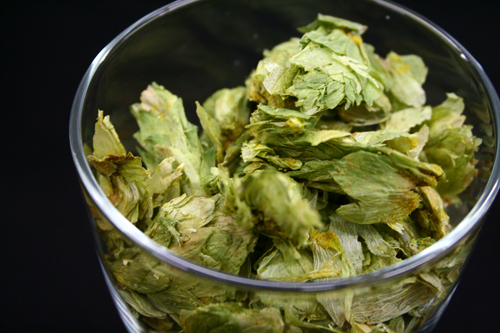In the Spirit of Spirits

Regional Japanese beer (ji-biiru) has been around for a long time, but many say it has actually only begun to taste good in the last decade or so. Before, it seemed that beer companies were simply appealing to that strong Japanese penchant for local products by slapping a special label with the area’s name on a bottle of cheaply made beer. Brewers, however—more specifically, micro-brewers—began to pay more attention to the actual taste and quality of the beer. A small industry was born of pride and genuine initiative, and it has been growing ever since. But if the taste makes the beer, then brewers must focus carefully not only on their recipes and brewing processes, but also on their actual ingredients. Baird Beer in Numazu, for example, uses fresh strawberries from Shizuoka for one of its seasonal beers. This of course ensures fresh ingredients with better taste. It also helps local economies and is good for the environment because ingredients are not transported over long distances. Hops are an essential part of a good beer, so we sat down with Jason Koehler who hopes to enhance the taste of beer through the careful cultivation of hops.
Q: What made you decide to get into the beer industry?
A: My wife and I were living in the US and she proposed we move to Japan. My career path in sales was pretty much useless in Japan and I knew I’d essentially be starting over. I started thinking about what I could do in Japan and kept coming back to beer. I’d been home-brewing at that point for awhile and had been inspired by all of the success stories of the US craft brewing industry. I thought if they could do it, then I could, too. I started studying intensely and attended some courses at the Siebel Institute to learn more about the craft. Once I arrived in Japan though, I soon figured out that the market wasn’t at all what I expected. I had to spend some time learning about it.
Q: How did you learn about the market?
A: I’m not sure I have yet! I took a job as an assistant brewer and account manager with the now defunct Aizu Beer in Fukushima, traveled a lot, and drank a lot of craft beer. When I first arrived just a few years ago, there were a lot of sub-standard beers around, but there has been some amazing developments since then and some breweries are making some really inspired beer. It’s an exciting time right now, lots of good things developing.
Q: Tell us about your hop farm?
A: It’s what I’d call a ‘pilot farm’ at this point. In researching the local market, I found that the only commercially grown hops in Japan are contract grown for one of the big breweries. I thought this was something of a travesty because Japanese hold local products in high regard and there are so many craft-breweries now operating in Japan that I think would love to have a domestically grown product. Beer takes some flak for not being eco-friendly, but being able to grow hops locally would only require Japanese brewers to import malt. Yeast can be sourced locally and there’s plenty of fantastic water here. I ordered multiples of ten hop varieties to test which ones like the local climate and latitude the best. Some were US West Coast varieties, some were classic English hops, the others were from Germany. The surprising thing is that ALL of them grew, some better than others for sure, but it was still a shock! This year I will test out a few more varieties and try to pin down which ones have the highest yields and flavor profiles that would be popular among local breweries. Much like grapes, there are an infinite number of factors that impact hop flavor characteristics. While there may be some similarities between locations, each growing region will have its own signature traits.
Q: What kind of traits do you look for?
A: Oddly enough, aroma is incredibly important. Most people think of bitterness in terms of taste only, but a great deal of how we taste things is influenced by our nose. Some noted aromas which can be derived from different hop varieties can be called pine-like, spicy, pungent, fruity, lemony, earthy, grassy, and even floral.
酒ごころ
日本でも地ビールが出回り始めて久しいが、本当においしい地ビールが登場し始めたのはここ10年くらいのこと。それ以前は、日本人のローカル志向に合わせて、いかにも御当地ビール風なラベルを貼り付けただけの、肝心の品質については甚だ怪しいビールしか見かけなかった。その後、各地の地ビールメーカーは品質・味を追求するようになってきた。そうした動きの中でプライドとやる気を持って誕生し、以来順調に成長を続けている地ビールメーカーがある。
ビールの味を決めるのは材料の配合比率や製造工程の違いだけではない。原料の選定も味を左右する大切な要素となる。沼津の「ベアード・ビール」では、地元・静岡の採れたてのイチゴを季節限定ビールの原料に使っている。新鮮なイチゴの使用で、美味しいビールができる。この「地産地消」の姿勢は地域経済の活性化にも貢献するし、原料の輸送距離が短くて済むから環境にも優しい。
ホップも味を決める重要な要素。そこで、ホップの研究を通じてビールの品質向上に努めているジェイソン・ケーラー氏に聞いた。
Q:ビール関係の仕事を始めたきっかけは?
A:アメリカに住んでいた時、妻が日本に移住したいと言ってきたんです。私のアメリカでの営業畑でのキャリアは日本ではほとんど役に立ちませんでしたから、それはゼロからの再出発を意味していました。日本で何ができるかいろいろ考えた末、ビールにたどり着きました。アメリカで私は自家製ビールを楽しんでいて、ずっとアメリカのビール産業の好景気振りに刺激を受けていました。で、私もビールで商売できるのでは?と考えました。そこで私はビールの製造技術について、シーベル醸造学校というところでさらに詳しく学びました。しかし、日本に来てみるとアメリカとは全く違うマーケットに驚き、まず日本のマーケットについて勉強することを余儀なくされました。
Q:どのような方法で日本のマーケットを学んだのですか?
A:どれだけ学べたか、まだまだ自信は無いのですが・・・福島県の今は無き「会津麦酒」で醸造助手兼経理担当マネージャーとして働き始め、各地の地ビールを飲み歩きました。ほんの数年前、私が日本に来た頃はレベルの低い地ビールが多かったですが、今ではかなり状況が変わり、本当に美味しい地ビールを作るメーカーが増えました。今は本当にいい状況になっていますね。
Q:ケーラーさんが管理するホップ農場について教えてください
A:現段階では「パイロット・ファーム
(実験農場)」的なものです。日本のローカル・マーケットを調査する中で、ある大手ビールメーカーだけが日本で契約栽培されたホップを使っていることを知りました。これはおかしなことです。日本人は地場産品を好みますし、今や日本にたくさんある地ビールメーカー各社も国内で栽培された原料を使いたがっているはずですから。環境に優しくないビールは評価が低くなりがちですが、ホップさえ地場産品を調達できればあとは麦芽だけ輸入すればいいのです。酵母は地元で調達できますし、きれいな水も豊富にあります。
私は10種類のホップを取り寄せて、どの種類がここの気候や土壌に合うか調べました。対象としたホップはアメリカ西海岸のもの、伝統的なイギリス産のもの、そしてドイツ産のホップです。その結果、全ての種類が日本の畑で育ってくれたのには驚きました。生育度合いに差はありましたが、驚きの結果でした。今年、もう少し種類を増やしてテストし、どれが一番生産性が高く、香りが良いかを絞り込む予定です。ブドウの栽培でも同じことが言えるのですが、ホップの栽培において香りに影響するファクターは無数にあります。違う場所の畑でも共通項もあるとはいえ、優れた畑にはそれぞれに必ず何かしら独自の優れている理由を見つけることが出来ます。
Q:どんな味のビールを作りたいですか?
A:意外に思われるかもしれませんが、ビールでは香りが決定的に重要なのです。味については多くの人が「苦みが強い」あるいは「苦さ控えめ」を重要視しますが、実際には味覚に関しても嗅覚に影響されるところが大きいのです。ホップの種類による香りの違いはとてもバラエティに富んでいて、松の香り、スパイシー、酸味が強い、フルーティー、レモンの香り、土臭い、草のような、花のような、など、様々に表現されます。








